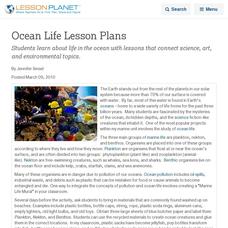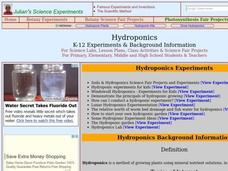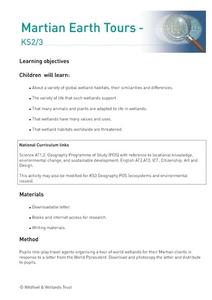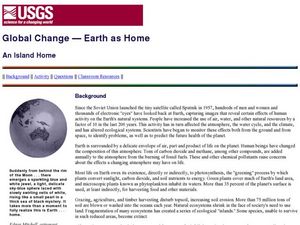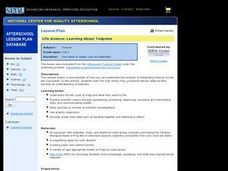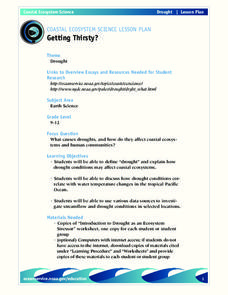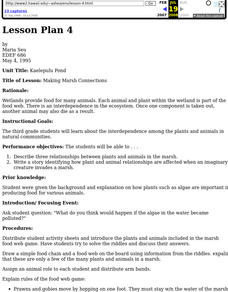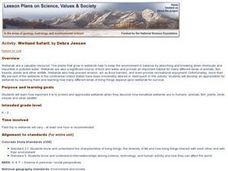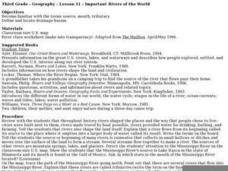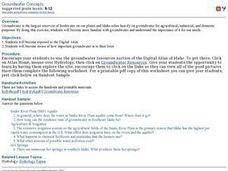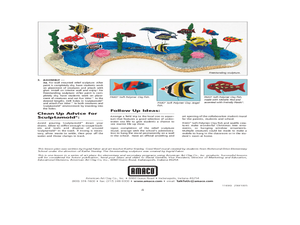Curated OER
Ocean Life Lesson Plans
Students learn about life in the ocean with lessons that connect science, art, and environmental topics.
Curated OER
Acid Rain in our State
Learners conduct internet research on acid rain, a serious environmental problem. They examine the pH levels of rainwater for their state, collect data from their community and investigate the causes and solutions for acid rain.
Curated OER
Oil Spill Cleanup
Students participate in an oil spill simulation and how to clean it up. For this oil spill lesson plan, students also calculate the cost of the clean up of an oil spill.
Curated OER
Hydroponics
Students examine how to grow plants using a hydroponic system. In this hydroponics lesson students identify the advantages and disadvantages of growing plants hydrologically.
Curated OER
Clouds
Students recognize the three main types of clouds. In this clouds lesson, students create a cloud mobile to understand clouds.
Curated OER
Martian Earth Tours
Students study a variety of global wetland habitats, their similarities and differences. They examine the variety of life that such wetlands support and determine that many animals and plants are adapted to life in wetlands, that...
Curated OER
Global Change- Earth as Home
Learners create their own environment. In this environmental protection lesson, students pretend they are the owners of a tropical island. They create jobs for the citizens and develop the island as a model environment.
Curated OER
Life Science- Learning About Tadpoles
Students investigate a frog's life cycle. In this tadpole lesson, students observe tadpoles in an aquarium and record results. Students fill in a KWL chart as an assessment.
Curated OER
Global Resources: What Will You Do with Your Power?
Students examine the human impact on natural resources. They read and discuss an article, evaluate nations regarding their environmental problem-solving, develop a presidential speech on the environment, and conduct a natural resources...
Curated OER
Chromatography - Chemical Separation of Colors
Third graders use the scientific method as they separate the colors used in ink. In this chromatography lesson, the teacher introduces students to how chromatography is used in several careers, then students perform an experiment to see...
Curated OER
Interactions Everywhere!
Students examine interactions within the environment and environmental engineering careers. They discuss and view photos of natural and manmade environments, explore various websites, create a web to identify interactions between living...
Curated OER
Fishing for Solutions
Students investigate the many ecological and economic issues related to over fishing the world's marine resources. Working in committees, students research the related topics of equipment and fishing techniques.
Curated OER
Getting Thirsty?
Students explore the concept of drought and its significance as a natural hazard. For this drought lesson plan, students complete 13 questions on an "Introduction to Drought as an Ecosystem Stressor" worksheet and discuss the responses...
Curated OER
Primary Energy Sources Pros and Cons
Students explore the different types of renewable and nonrenewable energy sources. In this earth science activity, students discuss the pros and cons of each type. They conduct a variety of experiments on renewable energy.
Curated OER
Making Marsh Connections
Third graders explore the interdependence among the plants and animals in natural communities.
Curated OER
Campaign Hot Buttons
High schoolers participate in a simulation that asks them to work as staffers for a candidate running for office. They are assigned to design, administer, and analyze a simple poll on an important community issue. Students develop a...
Curated OER
Wetland Safari!
Students identify how humans, fish, plants, birds, insects and other wildlife benefit from wetland environments. They observe a wetland and its inhabitants, draw a migration map that represents how birds use wetlands in traveling long...
Curated OER
Important Rivers of the World
Third graders become familiar with names of the different parts of a river, define and locate drainage basins, locate six of the continents and explore the major rivers on each one, conduct research on a river of their choice.
Curated OER
Groundwater Concepts
Students use a digital atlas and other electronic resources to explore freshwater reservoirs in Idaho. They discover the importance of groundwater and discuss the agricultural, industrial and domestic uses of underground reservoirs....
Curated OER
Exploring Life in the Coral Reef
Young scholars study life forms in coral reefs. In this ocean life instructional activity, students study life in coral reefs as they create a coral reef sculpture.
Curated OER
Save Me: Mother Earth
Learners read stories and articles about protecting the Earth. They collect data for a computer generated graph, and provide a key to show what the symbols represent.
Curated OER
Weather Emergency Safety
High schoolers identify different types of weather emergencies that may happen during the seasons. They list the steps involved when taking cover and fleeing dangerous weather patters. A comprehensive list of service agencies that can...
Curated OER
Oil Slick Emergency
Students examine how to recover and remove oil from an oil spill. In this oil spill clean-up lesson students use role play and act like a committee to determine how to clean up an oil spill.
